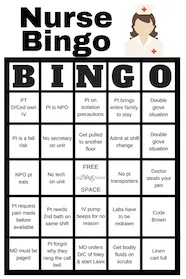Every profession has its benefits and drawbacks. Nursing is no exception. Although it’s one of the most rewarding careers, nursing certainly has its stresses. Nurses work hard to support patients and care for them during their most challenging moments. And while that hard work is rewarding, it also comes at a cost to nurses’ mental health and well-being.
A plethora of research shows that nursing is psychologically demanding, contributing to poor mental health in various ways, including anxiety, depression, compassion fatigue, secondary trauma, and burnout.
And all of that can affect a nurse’s work-life balance and general enjoyment of life.
People become nurses to help others, but they can’t help others if they’re not healthy themselves. That means that in order to be at your best for your patients, it’s essential to practice excellent self-care to safeguard your mental health.
The Mental Health Stigma
Within the healthcare profession, and nursing specifically, there’s a hidden culture of silence concerning mental health. Unfortunately, that stigma has created a culture of perfectionism in the workplace and silence around mental health.
Some nurses struggle to meet expectations while simultaneously pushing aside their thoughts, feelings, and experiences.
By addressing well-being and providing support for nurses’ mental health, workplaces can improve job satisfaction which helps boost workforce retention. Another byproduct of this effort is that healthy nurses will provide higher-quality patient care.
Resources To Support Nurses’ Mental Health
While many companies are working hard to address and provide support for nurses’ mental health, some haven’t moved in that direction yet. If your workplace falls into the latter category and you need help, there are many resources you can use to improve your mental health and overall well-being.
NOTE: if you are struggling, please reach out to someone you trust and let them know you aren’t doing ok. It’s important to know that you aren’t alone, and things can and will improve with help.
Here is a list of helpful resources to support nurses’ mental health.
American Holistic Nurses Association
This nonprofit organization works to promote a holistic approach to all areas of nursing (including practice, education, and research). On the American Holistic Nurses Association website, you will find evidence-based material, webinars, and additional resources to help teach nurses effective self-care and stress management strategies.
American Nurses Association (ANA)
The ANA has recently begun a campaign to support nurses’ mental health. The Well-Being Initiative focuses on caring for nurses while they tirelessly care for others. On this site, you will find a mental health support guide, podcasts, reduced-cost therapy, and other resources to help reduce stress, find joy, and improve overall mental health and well-being.
Are you feeling bad and need help but don’t know where to begin? Try taking the Stress Self-Assessment to get a clear picture of your current stress levels.
Anxiety and Depression Association of America
This site offers valuable guides to the types of therapy available and can help connect nurses with qualified therapists. You can also find information about ADAA’s free peer-to-peer support communities and helpful tips for managing anxiety and depression.
National Alliance on Mental Illness (NAMI)
NAMI is a grassroots mental health organization, and this organization provides a vast range of resources for many different types of mental health issues. The NAMI Helpline (1-800-950-6264) offers free referral information and support to callers Monday through Friday.
Hospice And Palliative Nurses Association
We all lose people we care about. Nurses, like anyone else, can lose friends and family members, and even patients too. However, many nurses choose to return to work rather than dealing with their feelings. Coping with grief is essential for good mental health.
Check out these short, powerful videos to help deal with any unresolved grief.
Peer Support Group For Nurses’ Mental Health
One of the most damaging aspects of experiencing poor mental health is feeling alone. No matter what you have gone through as a nurse, you are not alone.
That’s where peer support groups are extremely useful tools. They offer the opportunity to give and receive support from other nurses in a safe environment. Peer support groups are highly effective at reminding you that you’re not alone in what you’re going through.
If you’re interested in checking out nursing peer support groups, check out:
More Support For Nurses’ Mental Health
Whether you want to listen to podcasts or talk with someone 1-on-1 (or both!), here are some more helpful resources to support your well-being.
Happy
Part of the Well-Being Initiative, Happy partners with the American Nurses Foundation to provide support givers who offer compassionate listening anytime you need it. Here, you can privately discuss wellness, resilience, and recovery and receive the support, empathy, and connection that you deliver to patients all day long.
Call (833)327-0262 or text your first name to Happy at (858)367-3001.
Moodfit
Take self-care to work with you (and anywhere else you go)! Grab the Moodfit app and receive free access to helpful and customizable tools such as breathing exercises, mood journals, sleep hygiene, and more.
Nursing Podcasts
Listening to other nurses talk about the things you experience as a nurse is invaluable, especially if it is done with a dose of humor! Check out these terrific nursing podcasts:
Things You Can Do To Support Your Mental Health
One of the best analogies of self-care is to think of yourself as a pitcher of water. If you’re constantly pouring the water from your pitcher into areas of your life (ex: job, family, relationships, etc.) without replenishing it, eventually, your pitcher will be depleted of water.
In a nutshell, that’s what self-care is: replenishing your pitcher of water. But practicing self-care is most effective when you make it part of your regular, daily routine.
Here are a few ways to incorporate self-care and safeguard your mental health.
Practicing Gratitude
Notice that it doesn’t say “being grateful.” When facing mental health challenges, you won’t necessarily feel grateful. However, if you can practice listing out the things you are thankful for and acknowledging them, it can do a world of good for improving mental health and overall well-being.
Download this toolkit to help you get started.
Getting Enough Rest And Sleep
Nurses are used to being on the go and working nonstop. When that’s your default mode for so many hours a day, it can be hard to “turn it off.” Put some energy into learning how to improve relaxation and develop better sleep hygiene so that your body and mind can recoup after a long shift.
If that sounds tough to do, this guide may help.
Exercise And Diet
Work to get at least 30 minutes of moderate to strenuous physical activity five days a week. It will do wonders for lifting your mood and improving your mental health. Also, eating 5+ servings of fruits and vegetables daily will help your body function at its best.
To care for others, you must first care for yourself. Many resources offer support for nurses’ mental health if you know where to look. I hope this post helps to make them more accessible to you!
Take Time for Yourself
Sometimes indulgent self care is needed. Take yourself out to eat, get a manicure, lose yourself in a tv show, or take yourself shopping. Whatever you need to do to make yourself a priority again.
More Nursing Health And Support
- How to Support Nurses During a Crisis like COVID-19
- This is Why You Need to Join a Nurses Support Group Online
- 7 Benefits of Mentorship in Nursing
Download Nurse Bingo Today!

Liven up any shift with a fun game of bingo. See who can fill a row first!
Fill a whole card and lose grip with reality.
Your privacy is protected. We will never spam you.





